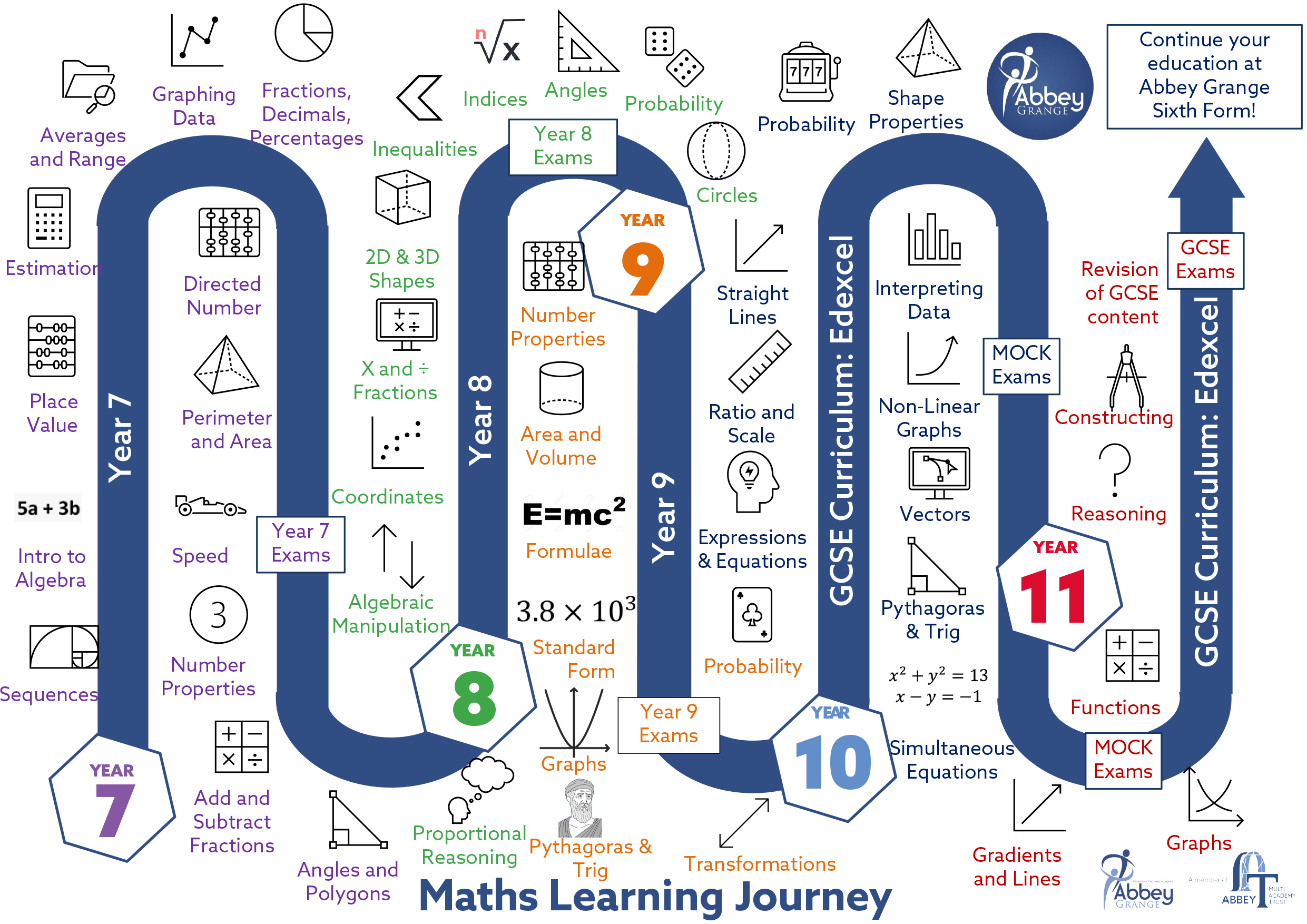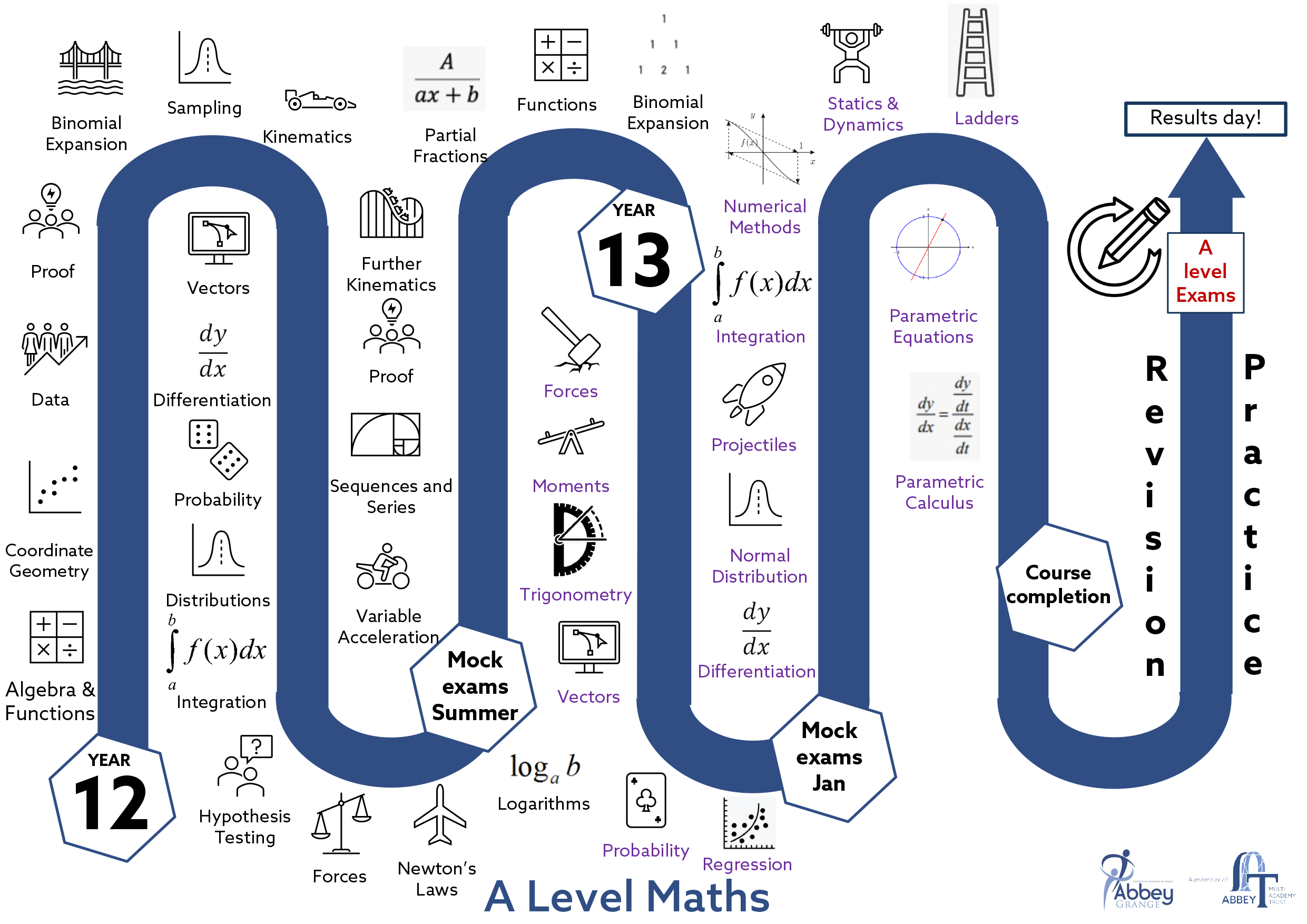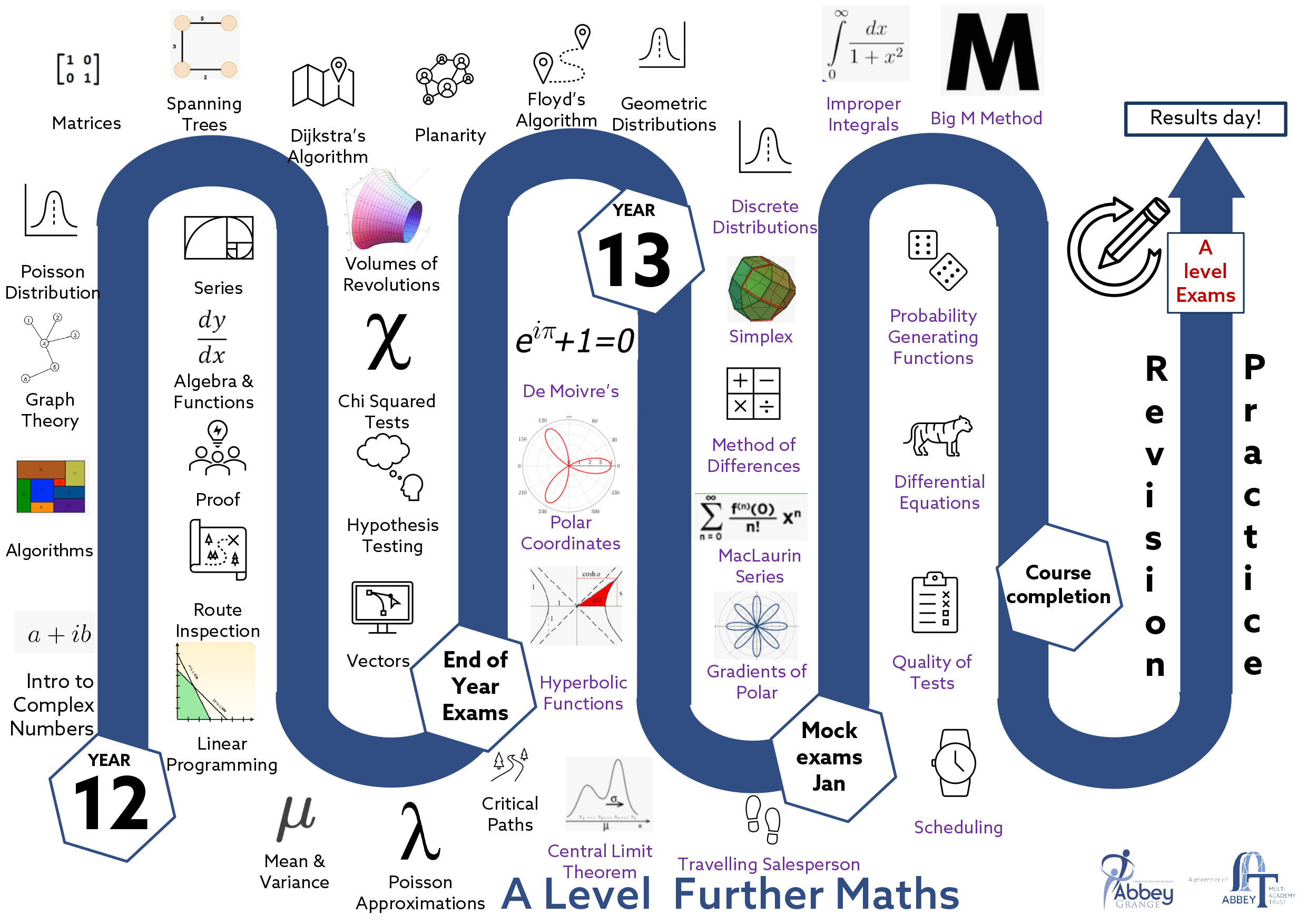
Our mission is to empower all students to master mathematics through a sequenced curriculum with deep, conceptual understanding that fosters confidence, curiosity, and critical thinking. We deliver an ambitious curriculum that challenges every learner and equips them with the skills to succeed in a rapidly changing world.

Maths Resources:
Key Stage 3
At Key Stage 3, our mathematics curriculum follows the White Rose scheme of work, providing a coherent, ambitious, and well-sequenced framework that empowers all learners to develop a deep and lasting understanding of key mathematical concepts. Covering number, algebra, ratio and proportion, geometry and statistics, the curriculum builds knowledge systematically, ensuring that students revisit and consolidate learning through purposeful interleaving and carefully structured progression.
Our approach is designed to challenge every learner, regardless of starting point, through rich tasks and high expectations that promote mathematical thinking and resilience. A central feature of our pedagogy is the purposeful use of oracy to foster confidence and curiosity in the classroom. Students are encouraged to verbalise their reasoning, explain methods, and engage in structured mathematical dialogue. These oracy-rich opportunities empower learners to develop fluency in mathematical language, collaborate effectively with peers and take ownership of their learning journey.
Through a culture of respectful discussion and critical questioning, students not only build their mathematical capability but also develop essential communication and problem-solving skills that prepare them for the next stage of education and beyond. The curriculum nurtures reflective, articulate and confident mathematicians — equipped to meet the challenges of KS4 and to thrive in a rapidly changing world.
In KS3, our students learn to justify their mathematical thinking, which encourages them to articulate their reasoning clearly and logically, a skill transferable to various life situations.
The curriculum provides opportunities to tackle increasingly complex problems, teaching students to break down challenges, apply different strategies, and persevere until they find solutions, fostering resilience and resourcefulness.
Developing fluency in mathematical fundamentals builds confidence and a positive attitude towards learning, which are essential for taking on new challenges and developing a growth mindset.
Regular group work and discussions in math class promote teamwork, communication, and empathy, encouraging students to appreciate different perspectives and work together effectively.
Each topic has a short A&D zone which will take place every two weeks to allow our students to showcase what they have been learning recently. Twice a year there will be opportunities for students to demonstrate their understanding through a longer more summative assessment.
You should study maths in KS4 because it helps you develop essential problem-solving and logical thinking skills that are useful in everyday life and almost every career. From managing money to understanding data and patterns, maths gives you tools to make better decisions. It’s also a key subject for progressing to further education and is required for many college and university courses and job opportunities. Plus, succeeding in maths can boost your confidence and open doors to exciting futures in science, technology, business and more.
Key Stage 4
At KS4, our mathematics curriculum is built on the White Rose scheme of work, offering an ambitious and empowering programme of study that prepares students for academic success and life beyond the classroom. Through a carefully sequenced and coherent structure, learners build on their KS3 knowledge across key areas such as number, algebra, ratio and proportion, geometry, statistics, and probability.
Our curriculum is designed to challenge every learner, with high expectations and rich tasks that deepen understanding and promote independent thinking. We place a strong emphasis on oracy—encouraging students to explain their reasoning, discuss problem-solving strategies, and use precise mathematical language. This fosters confidence and curiosity, helping students become more engaged, reflective, and articulate in their learning.
By developing both fluency and reasoning skills, we ensure students are equipped not only to succeed in their GCSE examinations, but also to navigate real-world challenges with logic and clarity. Whether progressing to further study or entering the world of work, our students leave KS4 as confident, resilient problem-solvers ready to embrace their next steps.
Following the White Rose Maths scheme of learning at Key Stage 4 helps students grow not just as mathematicians, but as individuals. The curriculum is designed to be ambitious and challenging, encouraging every learner to persevere through complex problems and develop resilience. Through regular opportunities to explain thinking, work collaboratively, and reflect on mistakes, students build confidence, curiosity, and a growth mindset.
By engaging with mathematical reasoning and problem-solving, students learn to approach challenges with determination and independence. The use of oracy — speaking and listening carefully in discussions — also helps them to communicate clearly, respect different viewpoints, and become more self-assured. These qualities are vital for success not just in exams, but in life, helping our students become thoughtful, responsible, and reflective young people ready to make a positive impact in the world.
As with KS3, each topic has a short A&D zone which will take place every two weeks to allow our students to showcase what they have been learning recently. In addition to this our students will start to apply their knowledge to GCSE exam papers. Students will sit an end of year 10 assessment covering all content studied so far, and in Year 11 there will be mock exams in Autumn and Spring term, before the real thing in Summer.
Completing the White Rose Maths curriculum provides an excellent foundation in core mathematical concepts, logical reasoning, and problem-solving skills. A Level Maths is the ideal next step, allowing you to build on that knowledge and explore new areas such as calculus, statistics, and mechanics. These skills are not only essential for a wide range of university courses and careers — especially in science, engineering, technology, and finance — but also help develop analytical thinking and resilience when tackling complex problems.
If you’ve particularly enjoyed the challenge of mathematics so far, Further Maths offers the chance to dive even deeper into the subject. You’ll study more advanced topics, enhance your mathematical thinking, and strengthen your academic profile—especially if you're considering maths-heavydegrees. Together, A Level Maths and Further Maths open doors to countless exciting opportunities.
Key Stage 5

Our Edexcel A Level Mathematics course empowers students with the knowledge and skills to tackle real-world problems and abstract concepts alike. Covering core areas such as pure mathematics, statistics, and mechanics, this course challenges every learner to think critically and creatively. Students explore topics including algebra, calculus, trigonometry, and data analysis—each designed to stretch their reasoning abilities and deepen their understanding of how mathematics shapes the world around us. This ambitious curriculum fosters confidence and curiosity, preparing students not just for exams, but for life beyond the classroom in STEM-related fields and beyond.

Further Mathematics is a course for those who are passionate about exploring the full depth and beauty of the subject. It offers a rich and rigorous experience that goes well beyond the standard A Level syllabus, covering topics such as complex numbers, matrices, proof, and advanced calculus. The course is ambitious by design and challenges every learner to push the boundaries of their mathematical understanding. It empowers students to tackle highly analytical problems with confidence and precision, while fostering a deeper curiosity about the subject. Further Maths is highly regarded by universities and is particularly beneficial for students considering degrees in mathematics, physics, engineering, and economics.

Level 3 Core Maths is an accessible and practical qualification designed to support students who are not taking A Level Maths but still want to develop and apply mathematical skills in real-life contexts. This course includes topics such as financial maths, statistics, and the analysis of data—skills that are relevant and empowering across a wide range of academic subjects and careers. Core Maths fosters confidence in handling numbers and interpreting information, encouraging curiosity about how mathematics applies to everyday decisions and professional settings. It is ideal for ambitious learners who want to stay mathematically engaged and gain a valuable edge in subjects such as psychology, biology, geography, business, and the social sciences.
Studying A Level Mathematics, Further Mathematics or Core Maths is not just about numbers and equations — it's about shaping who you are and who you aspire to become.
Mathematics encourages resilience. Whether you're solving a complex equation or grappling with a new concept, you learn to persevere through challenges and setbacks. The process of working through difficult problems helps to build mental toughness and a growth mindset—essential traits for success in any field.
It also cultivates independence and self-discipline. Maths demands focus, precision, and the ability to think logically under pressure. These habits develop over time, turning students into careful thinkers and confident decision-makers. You learn to trust your reasoning, reflect on your mistakes, and refine your approach—skills that transfer far beyond the classroom.
In Further Maths, the challenges are greater, but so is the reward. It nurtures intellectual curiosity and humility, as students realise the vastness of mathematical thinking and their own capacity to explore it. Collaborating on complex problems also builds teamwork, communication, and empathy—recognising that sometimes the best solutions come from shared effort and mutual respect.
Core Maths, with its real-world applications, empowers students to engage critically with the world around them. It encourages integrity and responsibility—especially when interpreting data or making financial decisions that impact others.
Through these courses, students don’t just become better mathematicians—they grow into more thoughtful, resilient, and responsible individuals. Mathematics, at its core, is a journey of character as much as it is a journey of numbers.
As with KS3 and KS4, we will complete a mixture of small, regular topic assessments along with termly summative assessments where students have an opportunity to demonstrate their longer-term understanding. There will be an internal assessment at the end of year 12, with a series of mock exams in the Autumn and Spring of Year 13, building up to the real thing in the Summer.
Studying A Level Mathematics, Further Mathematics, or Core Maths opens the door to a wide range of university courses and career pathways. These qualifications are highly valued because they develop critical thinking, problem-solving and analytical skills that are essential in both academic and professional settings.
A Level Maths supports progression into degrees such as mathematics, engineering, physics, computer science, economics, architecture, and various sciences. It equips students with the logical reasoning and confidence needed to succeed in quantitative subjects. For those aiming for highly competitive STEM courses, Further Mathematics offers a deeper, more rigorous experience that is often welcomed — and sometimes required — by top universities, including Oxbridge and Russell Group institutions.
Core Maths, while more applied in nature, is ideal for students who want to keep using maths alongside other A Levels. It strengthens skills in data analysis, financial understanding, and real-world problem solving — valuable for subjects like psychology, geography, biology, business, and health and social care.
All three qualifications prepare students for a wide variety of careers in fields such as engineering, finance, data science, technology, medicine, architecture, education, and more. Maths is not just a subject — it’s a powerful foundation for future success.